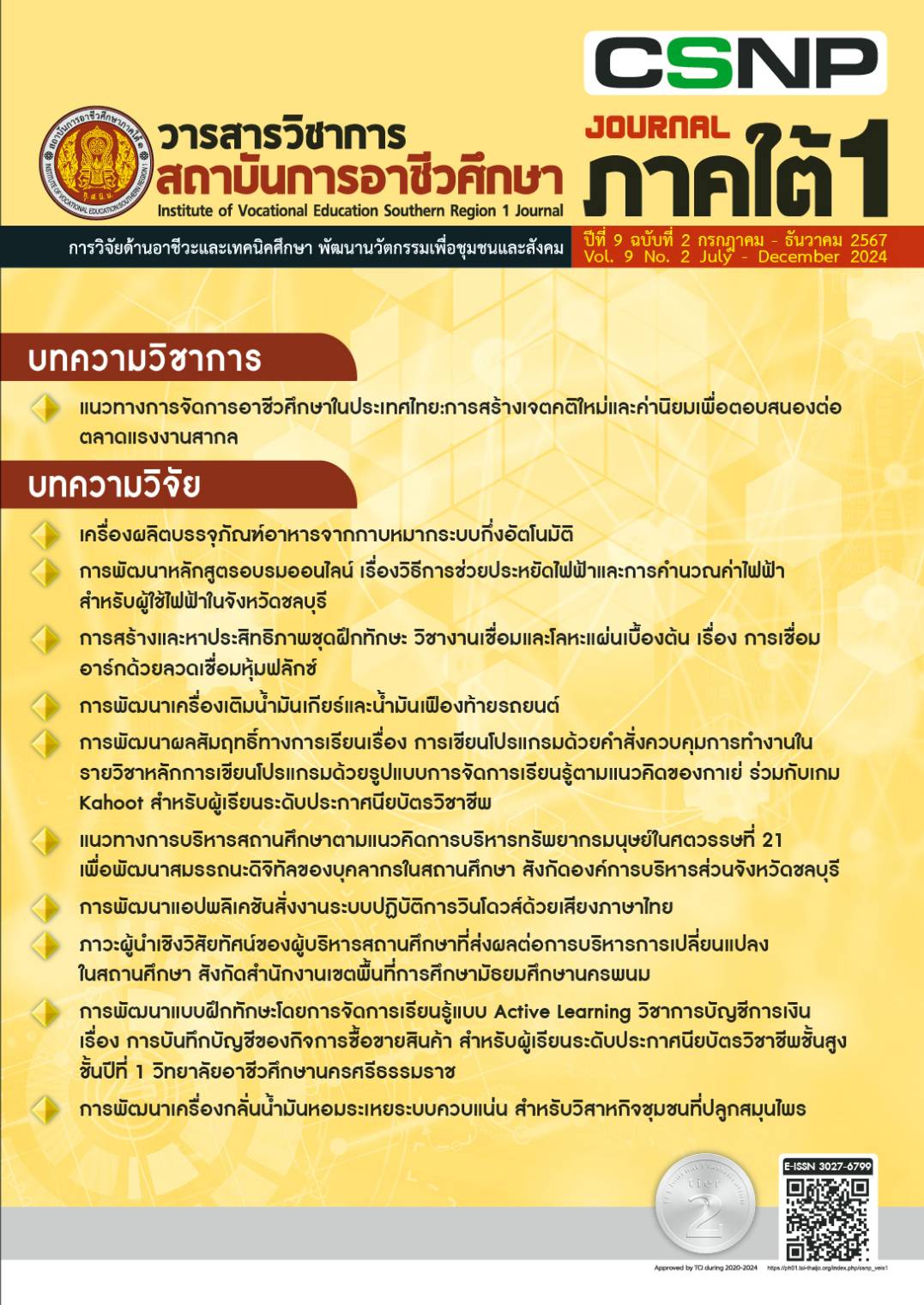The Development of Learning Achievement on Programming with Control Structures in a Programming Principles Course Using Gagné’s Learning Model Combined with Kahoot Game for Vocational Certificate Students
Keywords:
Learning Management Model Based on Gagne's Theory, Kahoot Game, Learning AchievementAbstract
This research aimed to: 1) compare learning achievement of students studying through a learning management model based on Gagne's theory combined with the Kahoot Game on the topic of programming with control structures compared to the group studying with a traditional learning method in the Programming Principle Course and 2) study the students' satisfaction with the learning management model based on Gagne's theory combined with the Kahoot Game on the topic of programming with control structures in the Programming Principle Course. This research employed an experimental design. The sample consisted of second-year business computer students from Nakhon Si Thammarat Vocational College in the first semester of the 2024 academic year. Cluster random sampling technique was used to select two groups, i.e., the experimental group of 36 students and the control group of 32 students. The experimental group received an instruction using the learning management model based on Gagne's theory integrated with Kahoot Game while the control group followed the traditional teaching method. The research instruments included a lesson plan, a learning achievement test, and a satisfaction questionnaire. Data analysis involved calculating mean, standard deviation, and test the hypothesis with an Independent Samples t-test.
The research results indicated that 1) the learning achievement of students who were taught using the learning management model based on Gagne's theory combined with the Kahoot Game on the topic of programming with control structures in the Programming Principle Course was significantly higher than that of the students learning with the traditional method with the statistically significant level at .01. 2) The students' satisfaction with the learning management model based on Gagne's theory combined with the Kahoot Game on the topic of programming with control structures in the Programming Principle Course measured by the satisfaction questionnaire was found in overall to be at a high level.
References
ณิรดา เวชญาลักษณ์. (2562). หลักการจัดการเรียนรู้ (พิมพ์ครั้งที่ 2). กรุงเทพมหานคร: สำนักพิมพ์จุฬาลงกรณ์มหาวิทยาลัย.
ทิศนา แขมมณี. (2559). ศาสตร์การสอน: องค์ความรู้เพื่อการจัดกระบวนการเรียนรู้ที่มีประสิทธิภาพ (พิมพ์ครั้งที่ 20). กรุงเทพมหานคร: สำนักพิมพ์จุฬาลงกรณ์มหาวิทยาลัย.
สุคนธ์ สินธพานนท์, ฟองจันทร์ สุขยิ่ง, จินตนา วีรเกียรติสุนทร, และพิวัสสา นภารัตน์. (2562). หลากหลายวิธีสอนเพื่อพัฒนาคุณภาพเยาวชนไทย. กรุงเทพมหานคร: 9119 เทคนิคพริ้นติ้ง.
สุวรรณกาญจน์ อักษรการ, พรรณี ผุดเกตุ, และชุติมา จันทรจิตร. (2560). ผลสัมฤทธิ์ทางการเรียนและทักษะการปฏิบัติ รายวิชาคอมพิวเตอร์และสารสนเทศเพื่องานอาชีพ ของนักเรียนระดับประกาศนียบัตร วิชาชีพ ชั้นปีที่ 2 โดยใช้รูปแบบการสอนของโรเบิร์ต กาเย. การประชุมหาดใหญ่วิชาการระดับชาติและนานาชาติ ครั้งที่ 8 22 มิถุนายน 2560 (หน้า 572-582). สงขลา: มหาวิทยาลัยหาดใหญ่
วรางคณา ชมพูพาน. (2561). การพัฒนารูปแบบการสอนโดยขั้นตอนของกาเย่กับการเรียนแบบผสมผสาน (Blended learning) เพื่อเพิ่มผลสัมฤทธิ์ทางการเรียนของนักศึกษาหลักสูตรประกาศนียบัตรวิชาชีพชั้นสูงปฏิบัติการฉุกเฉินการแพทย์ เรื่องการดูแลมารดาและทารกในภาวะคลอดปกติ, คลอดฉุกเฉินและการดูแลทารกแรกเกิด. วารสารวิทยาศาสตร์สุขภาพและการสาธารณสุขชุมชน, 1(2), 71-85.
ดนุพล สืบสำราญ, และศตวรรษ ศรีนุเคราะห์. (2567). ผลการจัดการเรียนรู้ด้วยเกม Kahoot เรื่อง บรรยากาศของเรา สำหรับนักเรียนชั้นมัธยมศึกษาปีที่ 1. วารสารวิชาการและวิจัย มหาวิทยาลัยภาคตะวันออกเฉียงเหนือ, 14(1), 28-41.
อุไรวรรณ ปานทโชติ. (2562). การพัฒนาผลสัมฤทธิ์ทางการเรียนคณิตศาสตร์ โดยใช้เกม Kahoot สำหรับนักศึกษาวิชาชีพครู โปรแกรมวิชาคณิตศาสตร์. วารสารครุศาสตร์ คณะครุศาสตร์ มหาวิทยาลัยราชภัฏกำแพงเพชร, 4(8), 101-108.
อนุวัติ คูณแก้ว. (2562). การวิจัยเพื่อพัฒนาการเรียนรู้ สู่ผลงานทางวิชาการเพื่อการเลื่อนวิทยฐานะ (พิมพ์ครั้งที่ 6). กรุงเทพมหานคร: สำนักพิมพ์จุฬาลงกรณ์มหาวิทยาลัย.
ณัฏฐภรณ์ หลาวทอง. (2559). การสร้างเครื่องมือการวิจัยทางการศึกษา. กรุงเทพมหานคร: สำนักพิมพ์จุฬาลงกรณ์มหาวิทยาลัย.
ปริษา ปั้นดี, ณัฏฐ์ ดิษเจริญ, และบุณณดา คำเสียง. (2567). การพัฒนาบทเรียนออนไลน์ตามแนวคิดของกาเย่เพื่อพัฒนาการเรียนรู้รายวิชาการออกแบบและพัฒนาเว็บไซต์สำหรับนักศึกษา ระดับประกาศนียบัตรวิชาชีพชั้นสูง. วารสารวิชาการเทคโนโลยีอุตสาหกรรม มหาวิทยาลัยราชภัฏสุรินทร์, 9(1), 55-66.
ภราดร รีชัยพิชิตกุล, ธนกร สายปัญญา, และพงศ์พิพัฒน์ พรมโคตร. (2567). การพัฒนาผลสัมฤทธิ์ทางการเรียนวิชาเทคโนโลยี (วิทยาการคำนวณ) เรื่อง การใช้อินเทอร์เน็ตค้นหาข้อมูล โดยการจัดการเรียนรู้แบบ 5e ร่วมกับโปรแกรม Kahoot ของนักเรียนชั้นประถมศึกษาปีที่ 6/2 โรงเรียนอนุบาลเชียงคาน “ปทุมมาสงเคราะห์”. วารสารครุศาสตร์ปริทรรศน์ คณะครุศาสตร์ มหาวิทยาลัยมหาจุฬาลงกรณราชวิทยาลัย, 11(2), 67-76.
ธีรวัฒน์ กัดมั่น, และภาสกร เรืองรอง. (2564). การพัฒนาบทเรียนคอมพิวเตอร์ช่วยสอน ตามรูปแบบแนวคิดของกาเย่ รายวิชาวิทยาการคำนวณ สำหรับนักเรียนชั้นมัธยมศึกษาปีที่ 1 โรงเรียนบางระกำวิทยศึกษา. วารสารวิชาการ การจัดการเทคโนโลยี มหาวิทยาลัยราชภัฏมหาสารคาม, 8(1), 33-45.
โชติมา วัฒนะ, ปภัสรา อาษา, ฐิติ คำหอมกุล, อรทัย วารีสะอาด, และวิภากร วัฒนสินธุ์. (2563). การประเมินความพึงพอใจของนิสิตสาขาวิชาสารสนเทศศึกษา มหาวิทยาลัยศรีนครินทรวิโรฒต่อกระบวนการเรียนการสอนโดยใช้โปรแกรม Kahoot!. วารสารสารสนเทศ สาขามนุษยศาสตร์และสังคมศาสตร์ มหาวิทยาลัยราชภัฏบ้านสมเด็จเจ้าพระยา, 19(1), 49-56.
Downloads
Published
Issue
Section
License
Copyright (c) 2024 Institute of Vocational Education Southern Region 1 Journal

This work is licensed under a Creative Commons Attribution-NonCommercial-NoDerivatives 4.0 International License.



